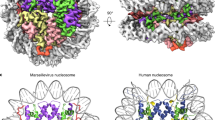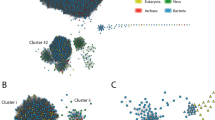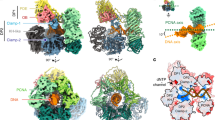Abstract
ALTHOUGH many authors have used lysis of eukaryotic cells on alkaline sucrose gradients to measure the size of single-stranded DNA subunits, these studies cannot distinguish a true DNA subunit from a subunit containing non-DNA, alkali-stable linkers. We report here that when Ehrlich ascites tumour (EAT) cell DNA is treated with Pronase before alkali denaturation the size of the released subunit changes from >70S to 26S. T7 DNA present throughout remains unchanged in size, indicating that the change is not due to a soluble nonspecific nuclease.
This is a preview of subscription content, access via your institution
Access options
Subscribe to this journal
Receive 51 print issues and online access
$199.00 per year
only $3.90 per issue
Buy this article
- Purchase on Springer Link
- Instant access to full article PDF
Prices may be subject to local taxes which are calculated during checkout
Similar content being viewed by others
References
Kavenoff, R., and Zimm, B. H., Chromosoma, 41, 1–27 (1973).
Hays, J. B., and Zimm, B. H., J. molec. Biol., 48, 297–317 (1970).
Hozier, J. C., and Taylor, J. H., J. molec. Biol., 93, 181–201 (1975).
Parodi, S., et al., Biochim. biophys. Acta, 407, 174–190 (1975).
Cleaver, J. E., Biochem. biophys. Res. Commun., 59, 92–99 (1974).
Simpson, J., Nagle, W., Bick, M., and Belli, J., Proc. natn. Acad. Sci. U.S.A., 70, 3660–3664 (1973).
Linn, J. D., and Wheeler, K. T., Biochem. biophys. Res. Commun., 65, 712–716 (1975).
Uhlenhopp, E. L., Biophys. J., 15, 233–237 (1975).
Lettre, R., Paweletz, N., Werner, D., and Granzow, C., Naturwissenschaften, 59, 59–63 (1972).
Clewell, D. B., and Helinski, D. R., Proc. natn. Acad. Sci. U.S.A., 62, 1159–1166 (1969).
Grossman, L. I., Watson, R., and Vinograd, J., Proc. natn. Acad. Sci. U.S.A., 70, 3339–3343 (1973).
Bendich, A., and Rosenkranz, H. S., Prog. Nucleic Acids Res., 1, 219–230 (1963).
Taylor, J. H., Int. Rev. Cytol., 13, 39–73 (1962).
Robinson, A. J., Youngblood, H. B., and Bellet, A. J., Virology, 56, 54–69 (1973).
Mego, W. A. thesis, Florida State Univ. (1970).
Karzel, K., and Schmid, O. J., Arzneimittel-Forsch., 18, 1500–1504 (1968).
Fujiwara, Y., Cancer Res., 35, 2780–2789 (1975).
Taylor, J. H., Proc. natn. Acad. Sci. U.S.A., 70, 1083–1087 (1973).
Taylor, J. H., Adams, A. G., and Kurek, M. P., Chromosoma. 41, 861–384 (1973).
Author information
Authors and Affiliations
Rights and permissions
About this article
Cite this article
HERSHEY, H., WERNER, D. Evidence for non-deoxynucleotide linkers in Ehrlich ascites tumour cell DNA. Nature 262, 148–150 (1976). https://doi.org/10.1038/262148a0
Received:
Accepted:
Published:
Issue Date:
DOI: https://doi.org/10.1038/262148a0
This article is cited by
-
Stably DNA-bound chromosomal proteins
Chromosoma (1994)
-
Effect of salt-treatment on manually isolated polytene chromosomes from Chironomus tentans
Chromosoma (1978)
-
Evidence for alkali-sensitive linkers in DNA of African green monkey kidney cells
Nature (1977)
Comments
By submitting a comment you agree to abide by our Terms and Community Guidelines. If you find something abusive or that does not comply with our terms or guidelines please flag it as inappropriate.



